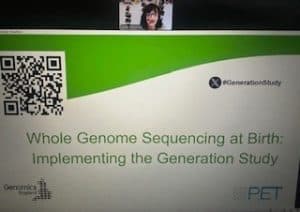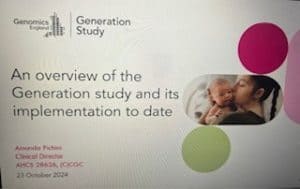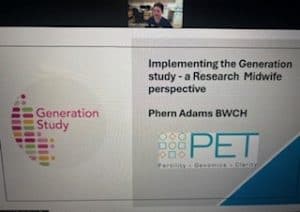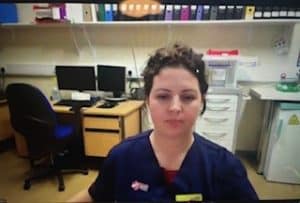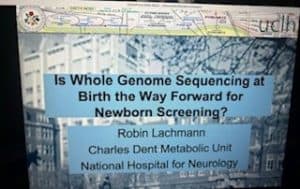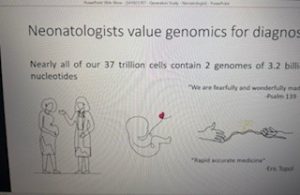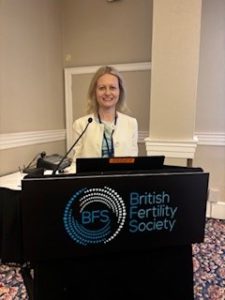4 November 2024
Louisa was pleased to attend Progress Educational Trust’s event “Whole Genome Sequencing at Birth: Implementing The Generation Study” on 23 October 2024. This event provided a progress update on The Generation Study, which is an NHS embedded research study undertaking whole genome sequencing of 100,000 newborn babies at different hospitals across England. The Generation Study’s aim is to better inform future decisions about using whole genome sequencing to support newborn screening and understand whether this can improve our ability to diagnose and accelerate access to treatment for rare genetic conditions. This followed a public consultation in 2022 which showed that 53 percent of the public supported whole genome sequencing of newborn babies at birth.
Amanda Pichini, Clinical Director at Genomics England, gave an introductory overview and progress update so far on the implementation of the Generation Study. She explained that hundreds of babies are born in the UK each year with rare genetic conditions. She went on to say that The Generation Study expands on the existing national newborn heel prick testing programme for nine genetic diseases, which has proven to be very successful. In doing so, it is hoped The Generation Study will help address the lengthy diagnostic odyssey which can take years to diagnose rare genetic diseases in babies and young children. This is important because early intervention can enhance the health and quality of life of many of these babies and children and because delays in a genetic diagnosis can mean that parents have gone on to have another child in the meantime who may also sadly have the same or a related genetic condition. She concluded her session explaining that The Generation Study is a long-term research study and that it represents a huge opportunity which may transform care through early detection and treatment for this landmark population birth cohort.
Images: Amanda Pichini, Clinical Director at Genomics England and Sarah Norcross, Director of Progress Educational Trust
Amanda Pichini explained that whole genome screening of newborn babies is a new population screening tool. It is separate from the NHS blood spot programme (‘the heel prick test’) which looks for for nine rare, serious and treatable health conditions. In doing so, it has three main aims:
- Evaluate the utility and feasibility of screening newborns for a larger number of childhood-onset rare genetic conditions on the NHS using whole genome sequencing.
- To understand how babies’ genomic date could be used to discovery research, focusing on developing new treatments and diagnostics for NHS patients.
- To explore the potential risks, benefits and broader implications of storing a baby’s genome over their lifetime.
Amanda Pichini explained that in designing The Generation Study there has been lots of engagement with the public, parents and families affected by rare conditions as well as healthcare professionals, policymakers and scientists. An ethical approach to its co-design in partnership with the NHS has also been adopted, together with strong governance from NHS England, the Department of Health & Social Care and the UK National Screening Committee. She went on to explain that they have now started to run The Generation Study across 13 hospital sites at 10 NHS Trusts and so far more than 500 samples have been taken and more than 1,000 parents have been recruited. In doing so, parents can sign up during the pregnancy and then give a sample at birth, comprising a small blood sample from the umbilical cord. Amanda explained that most results do not return a rare genetic condition but for those that do, it will lead to focused medical care. She added that The Generation Study tests for 200 rare conditions and that they expect around 1 percent of babies tested will return a rare genetic condition, producing an overall estimated total of 1,000 rare genetic diagnoses. In other words, 99 percent of babies’ parents will be told that ‘no conditions are suspected’ by letter and this will sent to the baby’s GP for their medical records, albeit this does not completely exclude the risk of a genetic condition presenting in future.
Amanda Pichini explained that there is ‘no one-size-fits-all’ approach to the recruitment journey for The Generation Study. This journey differs at different hospital sites and for different population demographics. Amanda went on to say that a high proportion of parents who initially express an interest go on to participate in the study, understanding that this focuses on early-onset diseases and conditions in a child’s life where early medical intervention can help and benefit the child.
Phern Adams then delivered the second presentation of the evening. Phern is a parent of a child with a rare genetic condition and Lead Research Midwife and Project Manager for the Generation Study at Birmingham Women’s Hospital. She explained that the Generation Study is important because it will help to plug genomic knowledge gaps. She went on to explain that Birmingham Women’s Hospital sees on average 8,000 births a year and that they have focussed on onboarding and staff engagement in the first instance. This has included lunch and learn sessions, screen savers with information, an intranet page with briefings and links, briefings with management, mandatory study and staff Facebook groups.
Phern Adams went on to explain that they have also focused on the patient pathway. She explained that patients are given a leaflet with information at their first prenatal booking appointment (before reaching 10 weeks of pregnancy). Community midwives are then asked to speak with parents at 16 weeks into the pregnancy to give an overview of The Generation Study, point parents to the leaflet and refer parents to sign up to the study. Then, at the mid trimester 20 week scan, when parents come to radiology and other departments parents are provided with more information about the study by way of patient information sheets in 10 languages. Furthermore, when expectant parents come for glucose tolerance tests in hospital they are given an overview of The Generation Study as well. After this, when parents attend for induction of labour parents are approached again about The Generation Study in case they have missed this. Moreover, women can self-refer as well.
Image: Phern Adams, Lead Research Midwife, and Project Manager for the Generation Study at Birmingham Women’s Hospital
Dr Chinthika Piyasena, Consultant Neonatologist at the Evelina London Neonatal Unit at St Thomas’ Hospital, then delivered the third session of the evening. Dr Piyasena explain that neonatologists value genomics for diagnosis, not least because there are higher chances of children in neonatal units having a genetic condition. She explained that there are now a larger array of conditions that we can test for. The Generation Study tests for 200 conditions and produces its results within 2 weeks of a baby’s birth due to whole genome sequencing at birth and this can transform care for babies. Dr Piyasena went on to explain that there are more than 6,000 births a year in the London area. Of these, around 10 percent of newborn babies will be admitted to a neonatal unit. She explained that The Generation Study currently aims to recruit around 20 percent of all births. If parents then receive notification that a genetic condition is suspected (with less than a 1 percent chance of ‘condition suspected’), a paediatric specialist then relays this research screening result and other confirmatory and laboratory testing is undertaken.Parents are provided access to genetic counselling and there is coordination of the results. Dr Piyasena added that this approach is redefining clinical referral pathways and helps to assure other aspects of routine care.
The last speaker of the evening was Dr Robin Lachmann, a Consultant in Inherited Metabolic Disease at the Charles Dent Metabolic Unit at The National Hospital for Neurology and Neurosurgery at University College London Hospitals and Chair of the Scientific Committee of the Recordati Rare Diseases Foundation. His session asked whether whole genome sequencing is the way forward for newborns? He pointed out that it might not be a complete solution. He explained that there is a risk of false positive diagnoses of a genetic condition. He went on to explain that whilst the NHS blood spot programme (‘the heel prick test’) currently screens for 9 and shortly 10 conditions, many EU countries currently already screen for 20 different conditions and the US Blood Spot test screens for up to 50 conditions As such, he explained that the UK lags behind other countries and that whole genome sequencing is therefore potentially a solution for England.
Need Advisory & Consultancy, a Fertility or Modern Family Lawyer?
At Louisa Ghevaert Associates, we understand that advances in genomics and technology are happening rapidly, creating new opportunities and issues. We have leading expertise in navigating and resolving complex family law and assisted reproduction law issues with a genetic aspect, including:
- Care and upbringing of children with genetic conditions and disabilities.
- Specific Issue and Prohibited Steps Orders (including applications concerning change of gender, informing a child about their biological origins and assisted conception, genetic testing, genome sequencing, vaccinations, issues associated with cord blood and tissue samples, ovarian tissue cryopreservation, testicular tissue banking and genomic medicine applications involving a child).
- DNA and genetic testing and the law.
- Trans and non-binary gender, genetic and fertility law issues.
- Intra-family egg and sperm donation.
- Bespoke expert witness law services to support claims for fertility treatment, donor conception and surrogacy following medical negligence and compromised or lost fertility (e.g. expert legal reports).
- Posthumous conception and genetic legacy (including the collection, storage and use of eggs, sperm and embryos in fertility treatment and surrogacy after death).
Images: Louisa Ghevaert, CEO & Founder Louisa Ghevaert Associates


